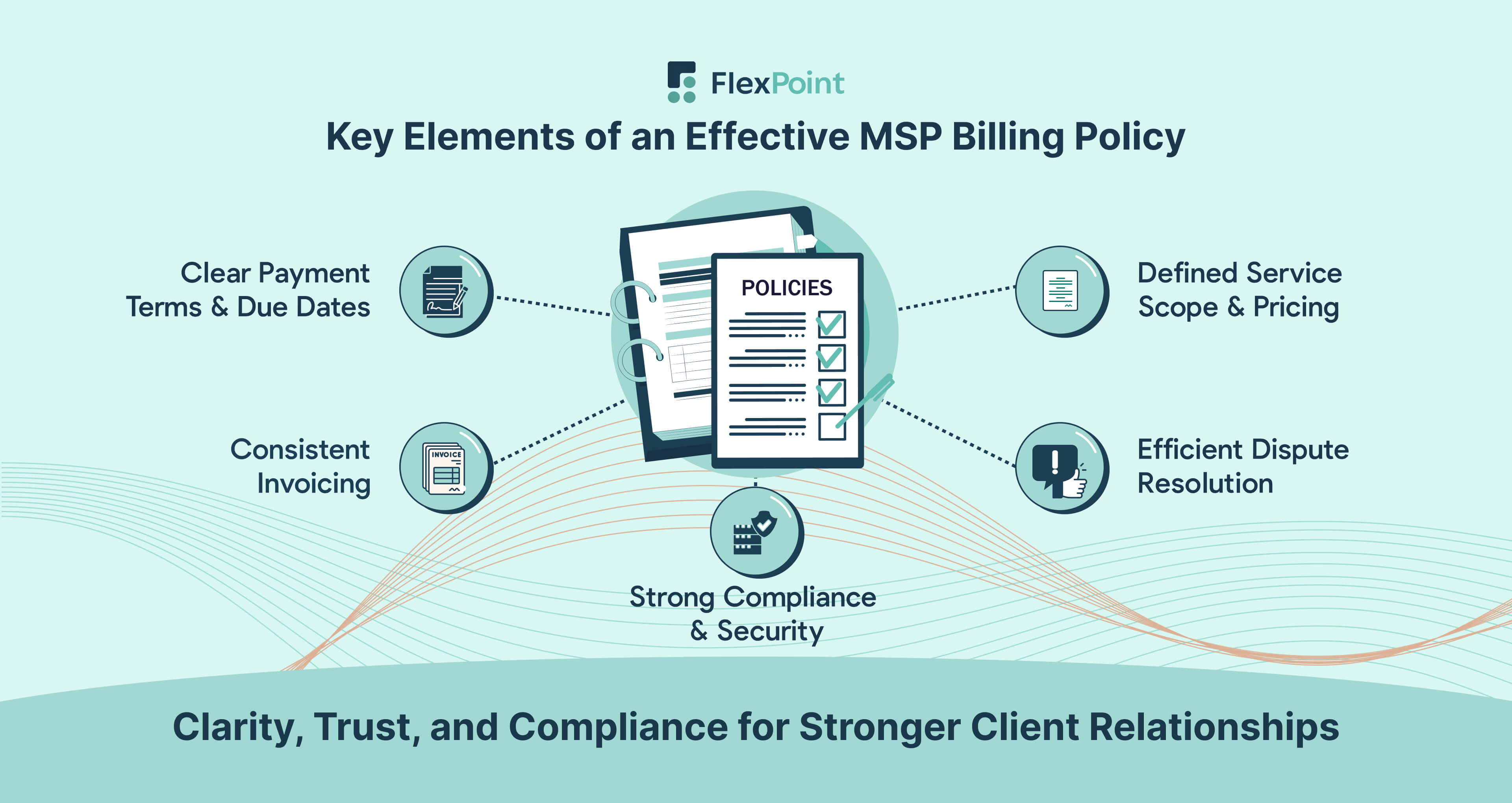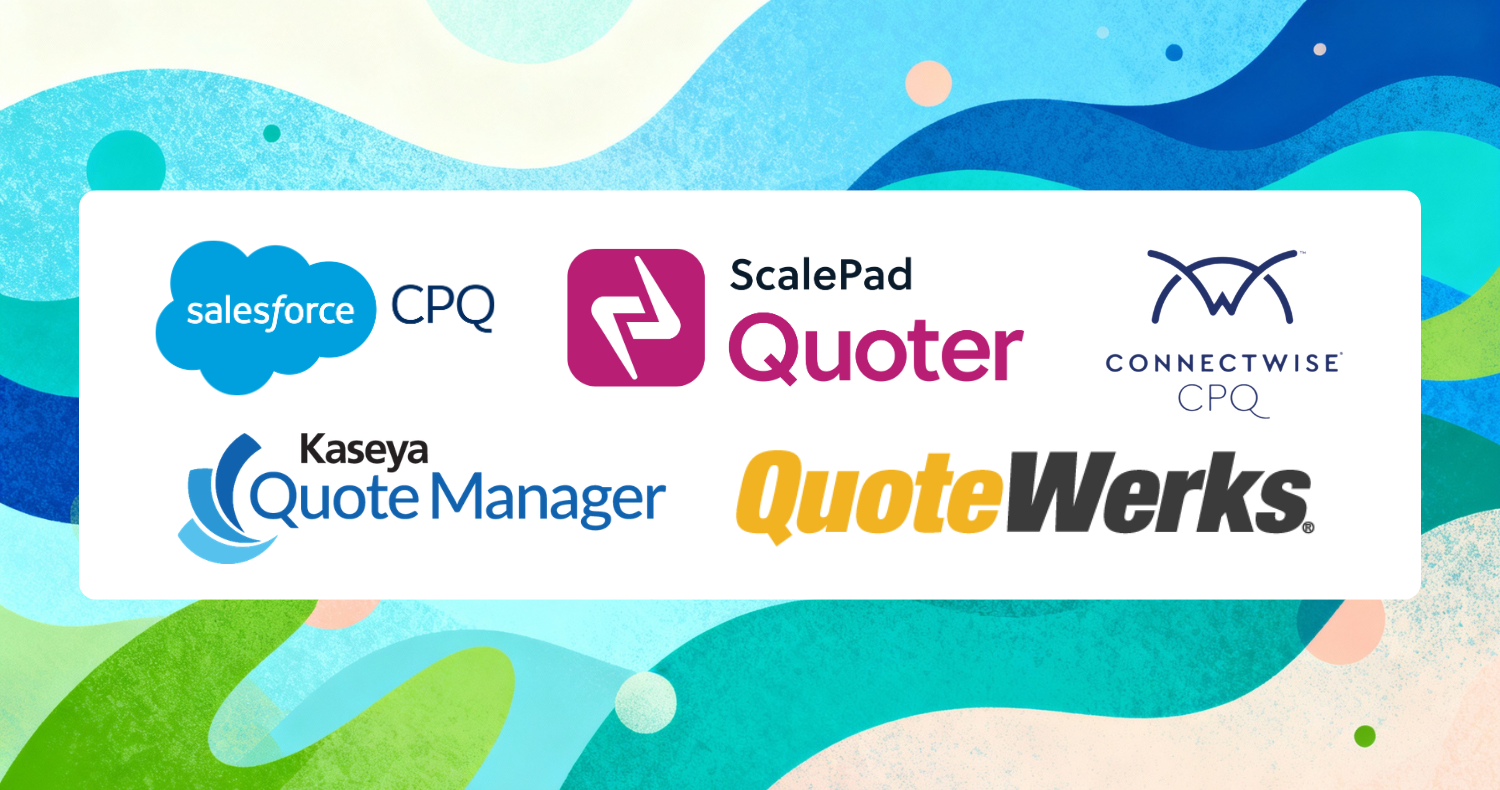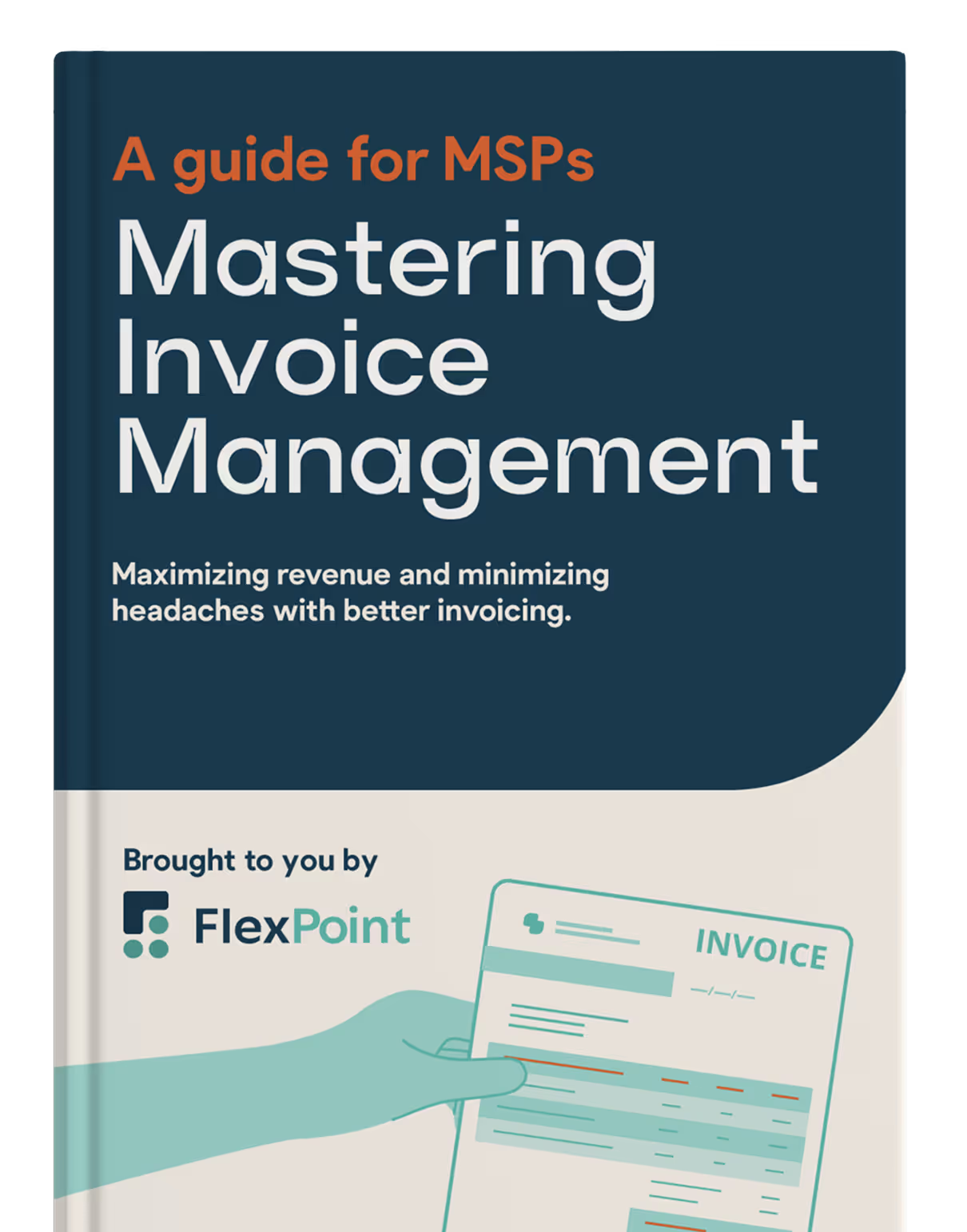Developing an Effective MSP Billing Policy: A Guide for Managed Service Providers

As MSPs grow and diversify, outdated billing practices can quickly become a bottleneck, leading to late payments, cash flow disruptions, and strained client relationships.
Without a clear, standardized billing policy, it becomes difficult to maintain consistency, reduce disputes, and scale operations effectively.
A well-defined MSP billing policy creates much-needed structure. It sets clear expectations around invoicing, payment terms, dispute resolution, and compliance, ensuring your team and clients stay aligned.
In this guide, we’ll break down what goes into an effective MSP billing policy, why it matters, and the steps you can take to build one that supports your business’s continual growth.
{{toc}}
What Is an MSP Billing Policy, and Why Is It Important?
An MSP billing policy is a structured framework that outlines all aspects of your business's billing and payment processes.
Consider it a comprehensive guidebook or SOP (standard operating procedure) for how your team handles client invoicing, payment terms, and any potential billing dispute resolution.
A well-defined billing policy reduces friction between you and your clients, ensuring consistency, transparency, and compliance in your financial operations.
Here's why having a clear billing policy is crucial:
- Consistency and Transparency: A standardized billing policy ensures consistency and transparency across all services and clients. It also establishes a structured process for recording and tracking transactions, making accounts receivable, cash flow tracking, and regulatory compliance more manageable. By maintaining accurate financial records and a uniform approach to billing, you can enhance client trust, streamline operations, and minimize disputes.
- Compliance: A Statista Report shows that 41% of MSPs are affected by PCI DSS compliance requirements. A billing policy outlines specific procedures for handling sensitive financial data, helping you meet regulatory requirements like PCI DSS or SAQ-A, and protecting your business and clients from potential regulatory risks and financial penalties.
- Building Trust: According to the 2024 PWC Report, over 90% of business executives believe that creating and maintaining trust improves their bottom line. When clients understand your payment terms and procedures, they feel more confident doing business with you. This trust translates to increased client retention and positive word-of-mouth referrals, ultimately bolstering business growth.
- Reducing Disputes: A study shows merchant error causes 20% to 40% of payment disputes. Clear billing policies minimize the likelihood of payment disputes. By outlining payment expectations, due dates, and procedures for handling discrepancies, you can prevent misunderstandings and ensure smoother payment collections. Addressing disputes effectively and promptly builds client confidence and helps maintain positive relationships.
- Supporting Cash Flow Management: Statistics show that 55% of all B2B invoices are overdue, significantly impacting cash flow and business growth.A billing policy helps you manage cash flow more effectively by enforcing consistent payment terms and procedures. When clients pay on time, you have the resources to cover operational expenses and reinvest back in business growth.
{{ebook-cta}}
5 Key Elements of an Effective MSP Billing Policy

An effective billing policy is crucial for MSPs to ensure smooth financial operations, maintain client satisfaction, and minimize disputes.
Here are the key elements of an MSP billing policy:
1. Payment Terms and Due Dates
According to the Hokodo report in 2024, 83% of B2B buyers will abandon a purchase if payment terms are unavailable.
That’s a massive loss of potential clientele. To avoid this issue, you should establish clear payment timelines, such as NET 15 or NET 30 days, communicate these terms during client onboarding, and clearly specify them within service agreements.
You need to offer clients multiple payment methods and let them select the option that best meets their needs. Offering payment methods such as credit cards, ACH transfers, and flexible financing caters to diverse client preferences and enhances convenience.
At the same time, late fees should be considered to discourage delays and ensure timely payments.
If possible, avoid using jargon in all documents, including contracts and invoices. Provide a clear breakdown of each charge using terms that are easy for clients to understand. You won’t want to spend extra time explaining terms that have already been expressed.
A well-structured billing policy enhances transparency, reduces payment disputes, and ensures predictable cash flow, creating a more professional and efficient billing process.
2. Invoicing Schedule
Research shows that businesses that provide detailed invoice instructions experience a 70% faster payment cycle.
Inconsistent invoice scheduling can lead to misunderstandings, strain client relationships, and result in late payments and cash flow issues.You need to specify the frequency and format of invoices to ensure consistency and alignment with client expectations.
Use AutoPay to simplify invoice scheduling and payment collection for your MSPs by automating the entire process. You can set up recurring payments on your client's behalf that are processed automatically on a predefined schedule, ensuring timely and consistent transactions.
The right system generates and sends invoices at set intervals, reducing human error and missed deadlines.
Custom rules allow MSPs to automatically charge invoices based on specific criteria, such as item categories or invoice terms, while automated payment reminders keep clients informed before deadlines.
By automating invoicing and payments, AutoPay enhances cash flow predictability, reduces administrative tasks, and saves time. Similarly, clients benefit from the convenience of automatic payments because it eliminates the need to manage recurring invoices manually.
3. Service Scope and Pricing
83% of B2B customers value clear pricing models, yet nearly 48% lack access to accurate pricing information.
A well-defined service-level agreement (SLA) is necessary to ensure clients understand service expectations, performance commitments, and recourse options in case of disruptions.
Additionally, you should offer customized billing models, such as fixed monthly subscriptions or usage-based pricing, to match client preferences.
Contracts should outline:
- Essential billing details
- Payment due dates
- Acceptable payment methods
- Surcharge policies (credit card surcharging only)
Clients should be notified in advance with clear explanations of pricing changes. Adhering to legal and industry regulations ensures compliance when implementing surcharge fees.
By prioritizing clear communication and structured billing, you can foster strong client relationships, reduce disputes, and enhance financial stability.
4. Dispute Resolution Process
Mastercard estimates that each dispute costs merchants and banks $15 to $70 in operational expenses, emphasizing the need for an efficient resolution process.
Having clear dispute resolution protocols helps resolve discrepancies faster. It also shows accountability and commitment to client satisfaction.
To ensure swift resolution, establish a dedicated dispute resolution team or contact point for faster responses.
Also, maintaining positive client interactions throughout the process fosters long-term loyalty. That, paired with transparent billing practices, detailed invoices, and well-defined payment terms, will eliminate misunderstandings and prevent disputes from arising.
5. Compliance and Security Standards
According to Colligo, non-compliance costs average $14.82 million, compared to $5.47 million for compliance, underscoring its importance.
Complying with industry regulations such as PCI DSS, SAQ-A, HIPAA, and GLBA is crucial for MSPs to protect sensitive data, avoid legal penalties, and maintain client trust.
On the other hand, non-compliance can lead to hefty fines; for example, PCI DSS violations can cost up to $500,000.
Data security should be a top priority for your MSP, as the average data breach costs $4.88 million.
Implementing security measures like multi-factor authentication (MFA), encryption, and access controls helps safeguard client information and ensures compliance with cybersecurity frameworks like NIST and CIS Controls.
Clearly outline these compliance measures in your billing policy to reassure clients about data security and regulatory adherence, building trust and confidence in your MSP’s reliability.
5 Steps to Develop and Implement a Billing Policy

This section offers an actionable guide to creating and enforcing a billing policy to help you achieve your business goals.
1. Assess Business Needs
To identify billing challenges and requirements unique to your MSP, begin by thoroughly assessing your service offerings. Whether recurring, project-based, or usage-driven, evaluate how well they align with your billing processes.
Identify financial pain points such as delayed payments, frequent invoice disputes, or inefficiencies in account reconciliation that may impact cash flow and client satisfaction.
Next, engage your team to uncover operational bottlenecks, such as reliance on manual invoicing, inconsistent billable hours tracking, or difficulties managing diverse billing models.
Gather client feedback to understand their pain points, such as unclear invoices or inconvenient payment methods.
This comprehensive needs assessment will help you identify gaps in your billing processes and tailor solutions to improve efficiency, accuracy, and client satisfaction.
2. Draft Clear and Comprehensive Policies
To create a clear and client-friendly billing policy, follow industry best practices by defining payment terms, invoicing schedules, and dispute resolution procedures.
Use simple language to outline due dates, accepted payment methods, and late payment penalties.
Structure the policy with headings and bullet points for easy navigation. Specify the process for handling disputes, including timelines for raising and resolving concerns, to ensure transparency.
Incorporate client-focused features such as flexible payment options and automated reminders. Collaborate with legal advisors to ensure compliance and fairness.
A well-crafted billing policy minimizes confusion, strengthens client relationships, and establishes a reliable financial framework.
3. Incorporate Automation
According to Ardent Partners, automated invoices are processed 80% faster than manual ones.
For improved efficiency and accuracy, you can leverage billing software to automate invoicing, payment reminders, and financial reporting.
For example, the right software will automatically generate invoices based on predefined terms, reducing manual errors and ensuring consistency.
Automated payment reminders notify clients of upcoming or overdue payments, improving cash flow.

4. Communicate with Clients
According to Versapay, 80% of companies report that miscommunication in the invoice-to-cash cycle leads to revenue loss.
Actively share and discuss your billing policy with clients during onboarding to prevent billing misunderstandings.
Also, it emphasizes the importance of the billing policy as a tool to ensure smooth financial interactions and mutual transparency during onboarding. (It benefits them as much as it does you.)
You should also provide a written copy outlining payment schedules, accepted methods, late fees, and dispute resolution procedures.
Take the time to walk clients through these terms, ensuring they fully understand their responsibilities and your processes.
Use visual aids like flowcharts, infographics, or FAQs to simplify complex billing details and make the information more accessible.
Send periodic reminders to reinforce understanding, and revisit billing policies during quarterly or annual reviews to address any changes or concerns.
Encourage clients to ask questions and provide feedback, fostering open communication. This approach builds trust, minimizes disputes, and strengthens long-term client relationships.
5. Monitor and Update the Policy Regularly
Billing policies should evolve alongside your MSP’s growth, services, and regulatory landscape.
Schedule regular reviews with your teams to ensure alignment with current operations, industry trends, and legal requirements.
Gather feedback from clients and staff to identify any inefficiencies or areas of confusion.
For instance, if your MSP introduces new services or shifts to usage-based pricing, update the policy accordingly.
To ensure compliance, stay informed about regulatory changes, such as tax or surcharging laws and data protection standards.
Regular updates enhance clarity, maintain relevance, and reinforce your commitment to operational excellence and client satisfaction.
Conclusion: The Role of a Well-Crafted Billing Policy in MSP Success
In this article, we emphasized the importance of a clear MSP billing policy to ensure financial stability, client trust, and compliance. We also addressed key elements such as payment terms, invoicing schedules, dispute resolution, and security standards.
We also discussed actionable steps for creating, implementing, and updating the policy, highlighting the benefits of automation, effective communication, and regular reviews. Additionally, compliance with industry regulations and robust security measures further solidifies trust and professionalism.
Proactively developing and enforcing a comprehensive billing policy helps you avoid disputes, optimize revenue, and maintain a steady cash flow. It also empowers staff to focus on delivering exceptional services instead of managing financial roadblocks.
Billing Automation tools like FlexPoint can make implementing billing policies easier and more efficient.
FlexPoint simplifies policy enforcement by automating invoicing, payment tracking, and reporting while seamlessly integrating with PSA and accounting systems.
With FlexPoint, you can maintain billing accuracy, save time, and improve overall financial management.
Take charge of your MSP’s financial success by crafting an effective billing policy.

Ready to simplify implementation and streamline billing processes?
FlexPoint offers the tools to enforce billing policies seamlessly and enhance client trust.
Schedule a demo today and discover how FlexPoint can empower your business.
{{demo-cta}}
Additional FAQs: MSP Billing Policies
{{faq-section}}













